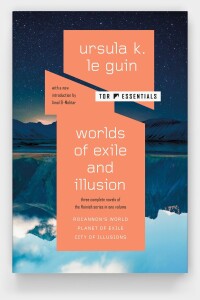 Ursula K. Le Guin’s Worlds of Exile and Illusion collects the three earliest published novels by the author. Specifically the first three Hainish novels (Rocannon’s World, Planet of Exile, City of Illusions) are contained with the pages of the large volume. They represent early work for the author, and introduce the Hainish setting for which she will become quite famous.
Ursula K. Le Guin’s Worlds of Exile and Illusion collects the three earliest published novels by the author. Specifically the first three Hainish novels (Rocannon’s World, Planet of Exile, City of Illusions) are contained with the pages of the large volume. They represent early work for the author, and introduce the Hainish setting for which she will become quite famous.
New to this particular omnibus is an introduction by award winning author Amal El-Mohtar. This particular introduction certainly tells the reader a bit about the individual who wrote it; while not dismissive, the author is quick to note that they considered at least one work out of date, while also noting that the work was somewhat foundational.
Rocannon’s World details a quest narrative, yet has the mix of fantasy and science fiction convention that some sixties works achieved better than others. Certainly here there are major quests through treacherous land, just as there are lost loves and great ships. The influence of the early 20th century fantasists is apparent, down to a brief notation on the barefoot, squat, sturdy look of one native group.
At the same time the story features strong themes of understanding, the importance of human life, and problems of proxy warfare deep in the tale. The worldbuilding that would make Ursula K. Le Guin a standard in any discussion of the subject is already here, with strange details quickly building to the obvious. In a few lines she often manages what would take other authors paragraphs, a brevity that suits the narrative quite well at times.
City of Illusions, a mite later for the author, and her evocative opening about darkness helps to illustrate this. The fact the narrative begins, functionally, with a group trying to nurse a very odd-looking stranger back to health helps to show how long that trope has existed in science fiction. This volume leans a bit less on classic fantasy, yet still manages to skirt the edge delightfully. Once again themes of understanding – both oneself and one’s surroundings – come into play. These would be lifelong themes for Le Guin.
While taking place in the same universe, largely different planets appear in the novels in this volume. Combined with the noticeably different cast of characters, it helps to show one important way Le Guin was ahead of her time. Specifically, in a way later popularized by authors such as Mercedes Lackey, Terry Brooks, and Brandon Sanderson, she has turned the setting into the primary if not only recurring element while spreading that setting so wide it is difficult to tell.
While Ursula K. Le Guin was a fantastically influential author with a large body of work behind her, there was a mix between style and genre within. While not the best of the author’s work, Worlds of Exile and Illusion collects a fascinating set of early pieces well worth reading. Both compared to much work at the time, and the career of their author, these stories are unusual steps in development.
(Tor, 2022)
